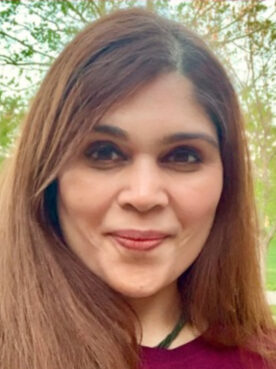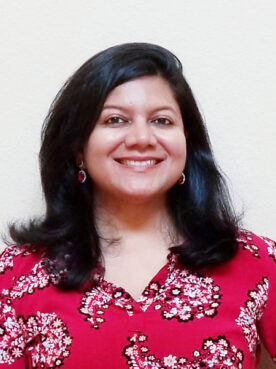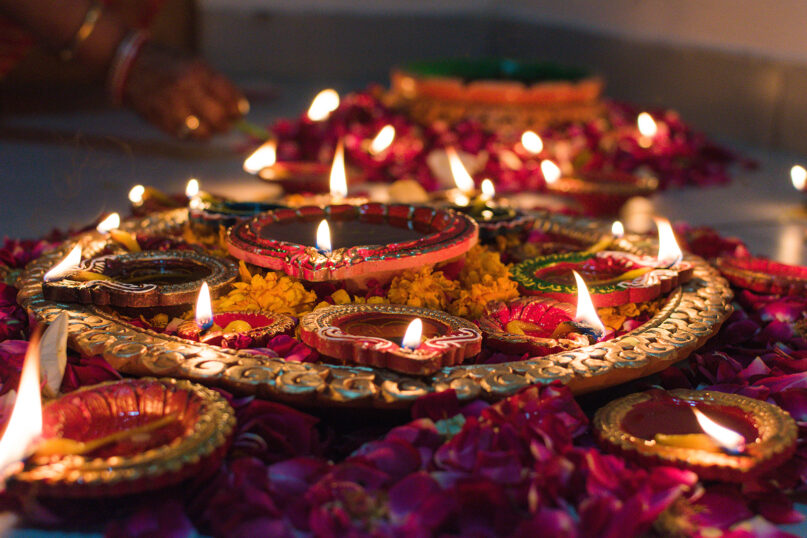(RNS) — When Hindu Heritage Month was held for the first time two years ago, its organizers hoped to educate their fellow Americans about the contributions Hindus have made in the world. Most could name yoga as a Hindu influence; some might bring up the holistic health practices of ayurveda. But since ancient times, Hindus have been pioneers in astronomy, architecture, mathematics and numerous other fields.
“We have so much to be proud about, and we’ve been very modest in keeping it to ourselves,” said Ramya Ramakrishnan, community outreach director for the Hindu American Foundation, one of the sponsors of the month’s activities. “This is the way to tell people: ‘Look at what our faith has accomplished.'”
Now, the organizers of this third Hindu Heritage Month hope their movement will educate not only the wider public, but Hindu Americans themselves, about their faith’s growing profile in the United States.
“Thirty-five years ago, we didn’t have these organizations and institutions,” said author Rajiv Malhotra at the kickoff event for this year’s program, held in Monroe Township, New Jersey. The leaders of those that existed “were scared,” he said, “and stayed within the temples, but not out there the way we are today.”
Vijay Satnarine, the director of education strategy for the Hindu American Foundation, said that there is work to be done within the Hindu community. Even today, many Hindus’ knowledge of their faith remains at a “high-school level,” he said, adding that Hindus in positions of power do not always bring the fullness of their culture or heritage to their professions.
For decades, some Hindu Americans have blamed the U.S. education system, which has given short shrift to Hinduism’s legacy in world thought. At the same time, critics say, American educators restrict their discussions of Hinduism and Hindu culture to polytheism, caste hierarchy and arranged marriages, misleading not only outsiders but practitioners themselves.
“This very constricted education has left us unable to talk about our own diversity,” said Satnarine.
But the emergence of India, the birthplace of Hinduism, as a nascent superpower has begun to change how the world thinks about the country and the faith. The inaugural event included the reading of a written statement from Prime Minister Narendra Modi of India. “The rise of Indians and Indian diaspora in diverse fields, from space to sports, trade to technology, has created an immense interest in India, its people and its culture,” it said.
The month’s organizers want people to know that Hindus and Indians are not synonymous. Instead, the month is meant to highlight the global Hindu community, which extends from Indonesia to Kenya to the Caribbean and is rooted in a shared value of universal oneness.

Richa Gautam. Photo via Twitter
The Hindu American Foundation has been marking Hindu American Awareness Appreciation Month since 2013 to recognize the specific contributions of the Hindu American diaspora, such as temples built on American land or the first Hindu members of Congress.
But the increasing attention to Hinduism in the past few years prompted a small group of Hindus to found the current initiative two years ago, aiming to rewrite a narrative centered on the caste system, Hindu nationalism and idol worship.
“We need to bring our cultural values, our mantras, or beautiful bindis and tilaks and colors to the world and be known for all of the good things that Hinduism has to offer,” said Richa Gautam, a member of the HHM core committee.
Despite its beginnings in the depths of the pandemic, the effort has taken off. Last year, about 100 proclamations in cities and school boards across the nation were issued. Virginia became the first and only state to sign a bill making October Hindu Heritage Month in perpetuity. And in 2023, the states of Georgia, Wisconsin, Ohio, Pennsylvania and New Jersey proclaimed the month Hindu Heritage Month.
This year, the organizers are emphasizing Hindus’ involvement in American life, hoping to dispel the view of Hinduism as a mystical, inward-looking faith.
“Hindu Americans have been very good citizens, enriching the tapestry through our cultural heritage and our universal Sanatan values,” said Gautam. “If we build awareness, there won’t be that exotic element that exists for us.”
Part of that task is to counter academics, even those in departments of religious studies, who have approached the faith from a Western, often Protestant Christian, paradigm of what “religion” means, advocates say.
Educational efforts like the Hindu American Foundation’s “Dharma Ambassadors” training program, which allows for Hindus to promote a streamlined narrative of the faith, or the accredited Hindu University of America, which offers courses on everything from Hindu feminism to advanced Sanskrit, strive to combat just that.
“A lot of our students, even though they were born and brought up as Hindus, they still have a very basic, partial, even sometimes erroneous knowledge about Hindu traditions,” said Aravind Swami, the vice president of operations for HUA. “When our students have discussions with anyone in the Hindu community, they’re able to speak with a greater sense of confidence and purpose.”

Ramya Ramakrishnan. Photo courtesy HAF
Jai Bansal, vice president of education for the World Hindu Council of America and one of the main organizers of Hindu Heritage Month, said the most valuable aspect of the initiative is to make all Americans recognize the Hindu values, from nonviolence to karma, as part of their history and their everyday lives. That, he said, is a job for all Hindus.
“One of the fundamental beliefs in our dharma is that ignorance is the root cause of all problems,” said Bansal. “It’s up to community leaders to try and distill our dharma in a form that modern society can easily digest.”
Bansal believes Hindu Heritage Month is a way to rally the global Hindu community, diverse as it is, to that task.
“If we continue with it, just think of someday 1 billion Hindus around the world celebrating their common heritage together — what kind of a message that will send to the world at large,” he said. “I’m just hoping for that day, whether I see it myself, or the next generation sees it.”





